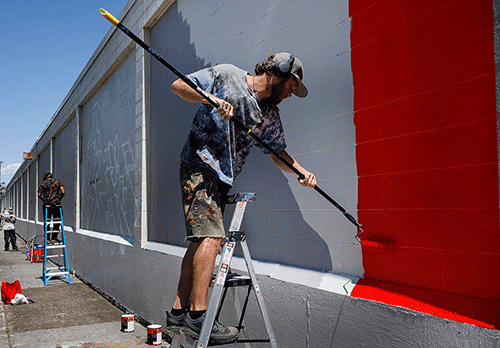In its preliminary findings, the Namibian Competition Commission (NaCC) yesterday pronounced itself on the proposed acquisition of Kansai Plascon Africa (KPAL) and Kansai Plascon East Africa (KPEA) by AkzoNobel.
The commission’s director of mergers and acquisitions, Johannes Ashipala, said merging parties are likely to gain market power, of which could be used against local manufactures, leading to reduction in product choice.
AkzoNobel is a Dutch multinational company that manufactures and sells paints and performance coatings for consumer and industrial use. It is active in over 150 countries and has manufacturing plants in South Africa, Botswana, Zambia and Mauritius.
KPAL is a subsidiary of Kansai Paint, a Japanese multinational manufacturing and selling paints and coating products globally. KPAL manufactures coatings used in various segments, namely decorative coatings, and industrial coatings, which include specialised paints such as automotive refinishes, protective coatings, wood finishes and generalised coatings for industrial use.
KPEA is a subsidiary of Kansai Paint, mainly operating in Burundi, Kenya, Tanzania, Uganda and Zanzibar. KPEA manufactures coatings used in various segments, namely decorative coatings, and industrial coatings which include specialised coatings such as automotive coatings, coil coatings and generalised coatings for industrial use.
Ashipala explained the commission’s decision was well-informed of some concerns that may come about from the proposed transaction, which is classified as a horizontal merger.
In theory, a horizontal merger, also known as horizontal integration, is the combination of two companies that compete in the same or similar industry. In other words, it occurs when one company buys out its competitor or they agree to join forces and create a new combined company.
“There will be negative impact on local paint manufactures. There are no competitors that will constrain them, given their market share in South Africa, which is more than 50%. There will further be a reduction in product quality and ability to change prices indecently (paint prices likely to remain high). Paint is crucial as a production input for many if not all sectors. Consumer welfare will also be negatively affected,” said the NaCC director.
Some of the possible merger impacts from the proposed transaction, Ashipala listed, include input foreclosure and expected monopoly pricing. He added there will be a reduction in production range and no customer choice.
Furthermore, Ashipala said NaCC exists to promote efficiency, adaptability and development of Namibian economy, and also to provide consumers with competitive prices and product choice.
“Our rationale for merger regulations is to prevent market structures that are prone to anti-competitive conducts from developing.
NaCC is concerned about firms gaining market power through mergers and acquisitions, changing of product choice, changing of products quality and changing of prices,” listed the director.
Meanwhile, the news did not sit well with the merger partners. Speaking on behalf of the entities, Patrick Smith refuted concerns raised by NaCC in regard to competition and input foreclosure.
Smith added that the primary rationale of the merger is to improve and expand AkzoNobel’s footprint in eastern and southern Africa.
“The rationale is to unlock substantial synergies to improve distribution and production as well as introduce better quality products and a wider range of decorative and industrial coating products to consumers,” Smith maintained.



